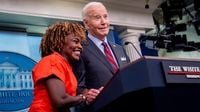Karine Jean-Pierre, the former White House press secretary who served under Presidents Barack Obama and Joe Biden, has officially left the Democratic Party and declared herself an independent. She shared this significant political shift alongside the announcement of her forthcoming book, Independent: A Look Inside a Broken White House, Outside the Party Lines, set to be published on October 21, 2025, by Hachette Book Group’s Legacy Lit imprint.
Jean-Pierre’s announcement came on June 4, 2025, marking a dramatic turn for a figure who was once the face of the Biden administration’s communication strategy. Her tenure, which lasted from May 2022 until the end of Biden's term on January 20, 2025, was historic — she was the first Black woman and the first openly LGBTQ+ person to hold the position of White House press secretary. Yet, despite her groundbreaking role and close ties to two Democratic presidents, Jean-Pierre has chosen to step away from party lines, urging Americans to rethink the rigid partisan boxes that have long defined U.S. politics.
In her book, Jean-Pierre offers a candid insider’s perspective on the tumultuous final weeks of Biden’s 2024 presidential campaign, focusing on the three weeks leading up to his decision to abandon his bid for a second term in July 2024. She describes this period as marked by what she calls a “betrayal by the Democratic Party,” which pressured Biden to withdraw amid growing concerns over his age and cognitive acuity.
Her decision to become an independent was not made lightly, as emphasized by her publisher. Jean-Pierre has spent decades in Democratic politics, including roles as a senior adviser on Biden’s 2020 campaign, chief of staff to Vice President Kamala Harris, and regional political director during Obama’s administration. Yet, her latest move reflects a broader message she hopes to send to Americans: to embrace political independence and vote according to personal values rather than strict party loyalty.
Jean-Pierre addressed this directly in a video posted to Instagram on the day of her announcement. She said, “The number one question people ask me is, ‘Karine, how do we get out of this? How do we protect our democracy? How do we protect vulnerable communities among us? What do we do next?’” Her book, she explained, is her answer to those questions. “I think we need to stop thinking in boxes and think outside of our boxes and not be so partisan,” she said. “If you are willing to stand side by side with me, regardless of how you identify politically—and as long as you respect the community that I belong to and vulnerable communities that I respect—I will be there with you. I will move forward with you.”
The book promises to be a “hard-hitting yet hopeful critique” of the American political system, which Jean-Pierre describes as broken and overly partisan. It aims to define what it means to be part of the growing segment of the U.S. electorate that identifies as independent. According to Gallup data cited in the book’s promotional materials, independents made up 43% of U.S. adults in 2023, a dominant voting bloc that Jean-Pierre believes could be key to revitalizing democracy.
During her time as press secretary, Jean-Pierre was known for staunchly defending President Biden’s mental acuity, even amid increasing public scrutiny and skepticism. For example, after the June 27, 2024, presidential debate against Donald Trump, widely regarded as a disastrous performance for Biden, Jean-Pierre insisted at a July 3 briefing, “He is as sharp as ever, as I have known him to be.” Such defenses often drew criticism from both journalists and political opponents, who questioned whether she was adequately addressing concerns about the president’s health and fitness for office.
Her tenure was not without internal challenges. Reports surfaced in late 2023 about attempts by White House communications chief Anita Dunn to push Jean-Pierre out of her role, citing concerns about her grasp of issues and preparedness. Despite this, Jean-Pierre remained in her position until Biden’s term ended, concluding with an emotional farewell briefing in January 2025 that some White House aides criticized for overshadowing a major hostage release announcement.
Jean-Pierre’s departure from the Democratic Party and her forthcoming book have sparked varied reactions. A prominent Democratic source dismissed her as “incompetent, not independent,” while others speculated that financial incentives motivated her pivot. Conservative commentators have criticized her book as an attempt to rewrite her role in what some describe as a cover-up of Biden’s decline. Journalist Aaron Rupar remarked, “It’s sad that Biden stuck with Karine Jean-Pierre for all those years despite the fact she was not that great at her job, only for her to turn around and write a book about why she left the Democratic Party and is now an independent.”
Despite the backlash, Jean-Pierre’s book is poised to join a growing collection of tell-all accounts examining the Biden White House and the 2024 election cycle. Notably, Jake Tapper and Alex Thompson’s Original Sin: President Biden’s Decline, Its Cover Up, And His Disastrous Choice to Run Again has already topped bestseller lists, offering a critical narrative of the administration’s handling of Biden’s health and campaign decisions.
Jean-Pierre’s narrative, however, offers a distinct perspective, focusing not only on the personal and political struggles within the White House but also on the broader systemic issues plaguing American democracy. Her call for Americans to vote their values and maintain individuality within party lines challenges the entrenched two-party system and advocates for a more nuanced political engagement.
As the political landscape continues to evolve, Jean-Pierre’s shift to independence and her forthcoming critique may resonate with many voters who feel alienated by partisan politics. Whether her book will influence the national conversation remains to be seen, but it undeniably adds a compelling voice to the ongoing debate about the future of American democracy and the role of political parties.
In the end, Jean-Pierre’s journey—from a trusted Democratic operative defending a sitting president to an independent critic urging Americans to think beyond party loyalty—encapsulates the complex and often turbulent nature of contemporary U.S. politics.






